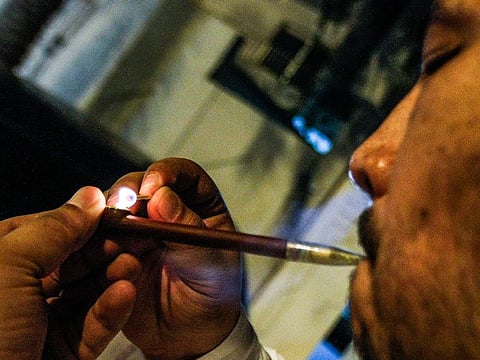Medwakh smoking more harmful than cigarettes
More awareness needed about the risks of medwakh use, says NYUAD graduate

Abu Dhabi: Medwakh smokers are at greater risk of suffering from the risk factors of cardiovascular disease compared to those who smoke only cigarettes, a new study has revealed.
The study, conducted by New York University Abu Dhabi graduate, Yazan Al Ajlouni, found that the traditional pipe, which uses a form of loose tobacco known as dokha, statistically increased the likelihood of cardiovascular disease risk factors by about four times.
While more research is needed to fully understand the hazards of medwakh, Al Ajlouni says this understanding should be warning enough.
“Medwakh use is very widespread among youth in the region, yet it is even more dangerous than cigarettes. In fact, we found that medwakh smoking increased cardiovascular risk for medwakh-only smokers, as well as among those who smoked it in combination with other forms of tobacco,” Al Ajlouni told Gulf News.
“Those who smoked only medwakh were found to be 5.25 times more likely to be at risk of cardiovascular diseases, as measured by the level of risk factors like low-density lipoprotein and lower Apolipoprotein A,” he added.
The use of medwakh is continuing to rise in the UAE, with pipe smoking being the second most common form of tobacco use among Emiratis. Yet, not enough is known to date about its risks.
A 2018 American University of Sharjah study that performed preliminary analysis to characterise the dokha used in medwakh found that various products contained 22 irritants, three known carcinogens and five central nervous system depressants. Another 2018 study by University of Sharjah researchers revealed that dokha contains higher levels of nicotine and tar in comparison to cigarettes.
Worse than cigarettes
Al Ajlouni’s research is one of the first studies to look into the effects on the human body of smoking this dokha.
It used self-reported surveys provided by 471 Emiratis aged 18 to 50 years. The data was derived from the NYUAD’s cohort study, the UAE Healthy Future Study. Blood and urine samples were then collected from the selected participants to determine their type and level of smoking, as well as their cholesterol levels.
According to Al Ajlouni, 97 per cent of the study participants were men. In addition, 15.2 per cent of participants did not accurately report their smoking habits.
“You would need a bigger, more representative sample to properly explore the effects of medwakh smoking on overall health, but we know now that it is worse than cigarette smoking,” he added.
An easy fix
Medwakh was also most commonly smoked by Emiratis in the study aged between 18 to 24 years. Younger smokers probably prefer the pipe because of its convenience, Al Ajlouni said.
“It takes longer to smoke a cigarette or two in order to get the fix a smoker is seeking. In contrast, one puff of the medwakh is all it takes to get the same amount of nicotine,” he explained.
The convenience of medwakh, and the lack of awareness about its risks, are both making the problem of medwakh use more prevalent.
“Direct policy interventions are necessary, and measures need to be taken to increase public awareness about the hazards of medwakh,” Al Ajlouni said.
A medwakh is a smoking pipe used in Arabia to smoke loose tobacco known as dokha. It is differentiated from a Western pipe by its smaller bowl.
Those who smoked only medwakh were 5.25 times more likely to be at risk of cardiovascular disease risk factors, according to Al Ajlouni’s study.


